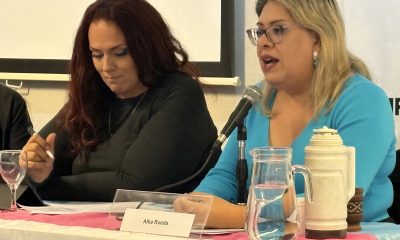United Nations
Global anti-LGBTQ+ rights backlash overshadows UN General Assembly
Uganda’s Anti-Homosexuality Act signed into law in May
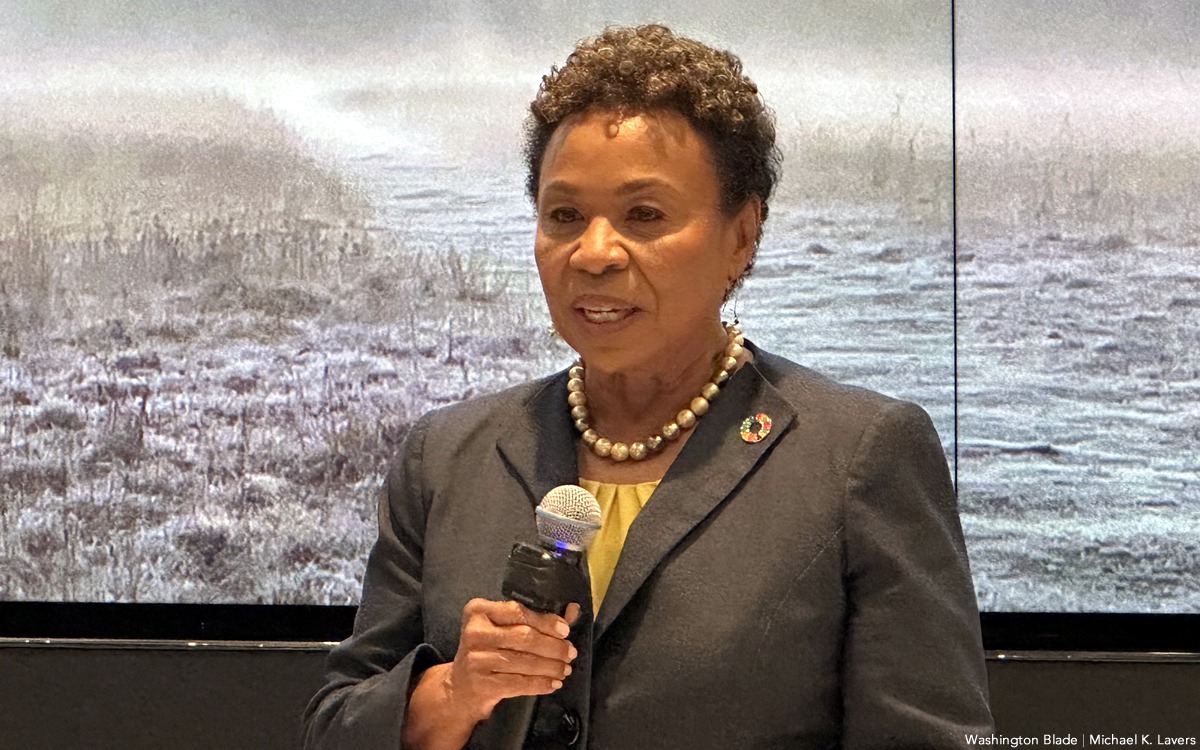
NEW YORK — Government officials, politicians and activists who traveled to New York for the U.N. General Assembly expressed their growing concern over the global backlash against LGBTQ+ and intersex rights.
“The emergence of this new wave of anti-LGBTQ+ laws first of all is scary, but secondly is deadly,” said U.S. Rep. Barbara Lee (D-Calif.) on Monday during an event the African Services Committee hosted in Manhattan. “We have to really understand what’s at stake with these laws.”
Jessica Stern, the special U.S. envoy for the promotion of LGBTQ+ and intersex rights abroad, and Dr. Rebecca Bunnell, acting principal deputy coordinator for the President’s Emergency Plan for AIDS Relief, are among those who also spoke at the event. Outright International Executive Director Maria Sjödin, Rainbow Railroad Executive Director Kimahli Powell, activists from Uganda, Kenya, Tanzania and Ghana and journalist Anne-Christine d’Adesky also participated.
Ugandan President Yoweri Museveni on May 29 signed his country’s Anti-Homosexuality Act, which contains a death penalty provision for “aggravated homosexuality.” Lawmakers in Kenya and Tanzania over the last year have proposed similar measures.
A bill that would criminalize LGBTQ+ and intersex identity and allyship in Ghana is currently before the country’s lawmakers. Police in Nigeria’s Delta state last month arrested more than 200 people at a same-sex wedding.
Lee noted African leaders who champion these bills and laws have alliances with U.S.-based groups that oppose LGBTQ+ and intersex rights.
“Hate is everywhere and it’s really important that our government do a better job of tracking — of course U.S. persons and organizations and what their role has been advancing these laws,” said the California Democrat.
D’Adesky noted Congress has yet to reauthorize PEPFAR and there is “an enormous fight.”
“The anti-LGBTQ forces, which are the family values (supporters) in the GOP and the extreme right, have been using this issue of HIV funding and HIV programs as a kind of proxy … to go after democratic societies, not just here in the United States, but everywhere,” said D’Adesky. “It’s a very deliberate strategy to link the issue of LGBTQ rights and homosexuality with HIV service provision.”
President Joe Biden on Tuesday in his U.N. General Assembly speech noted PEPFAR has saved “more than 25 million lives” in more than 55 countries around the world.
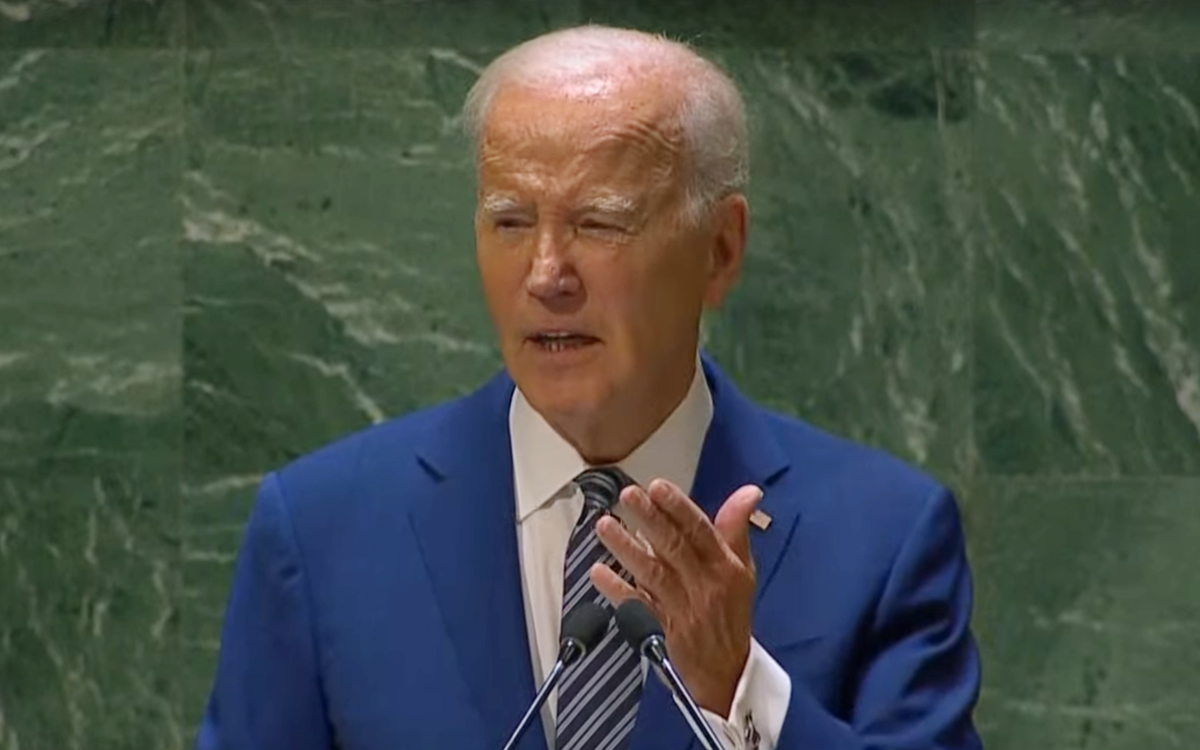
American officials earlier this year postponed a meeting on PEPFAR’s work in Uganda in order to assess the Anti-Homosexuality Act’s potential impact on it.
UNAIDS in a report it released in July raised concerns over a spike in HIV among gay and transgender people in eastern and southern Africa due to anti-homosexuality laws. The U.N. body noted laws that criminalize consensual same-sex sexual relations remain a significant obstacle in preventing and treating HIV among LGBTQ+ and intersex people.
“We have been trying to find communities and groups that can ensure that everybody has access to life saving services for HIV testing, prevention, PrEP, treatment, etc.,” said Bunnell during the African Services Committee event.
Bunnell, who previously lived and worked in Uganda, described the country’s Anti-Homosexuality Act as “horrific.” Bunnell nevertheless added the law has made LGBTQ+, intersex and HIV-specific issues more visible.
“At some level it’s really heartening to see that we are at least able to talk openly and have a conversation where we are now addressing issues that were completely hidden at that time,” she said. “We’re in a very challenging, but better place in that sense.”
Bunnell said she and her colleagues are in “active communication” with Stern and other Biden-Harris administration officials to see “what we can do, where could we restrict funding, where could we make statements, where can we protest against the absolutely horrific legislation in Uganda, where can we more proactively look at other countries that we’ve heard from today.”
The U.S. in June imposed visa restrictions on Ugandan officials.
The World Bank Group on Aug. 8 announced the suspension of new loans to Uganda. The European Union last week said it would continue to provide funding to the country.
Sjödin after the African Services Committee event noted to the Washington Blade that the World Bank has human rights safeguards in place. Sjödin stressed, however, the issue of cutting aid to countries with anti-LGBTQ+ and anti-intersex rights records is “extremely nuanced.”
“I don’t think that cutting aide is a general remedy for any of this,” said Sjödin. “I don’t think that in general you can say, oh stop all foreign aid to any country where discrimination occurs because as we know this is not isolated to a few countries in Africa. We do know that LGBTIQ people are actively persecuted in many more.”
Openly gay Irish prime minister speaks at UN LGBTQ+, intersex rights event
Biden in his General Assembly speech referenced violence and persecution based on sexual orientation and gender identity.
U.S. Ambassador to the U.N. Linda Thomas-Greenfield during an interview with MSNBC’s Rachel Maddow on Monday described Uganda’s Anti-Homosexuality Act as “horrific” and said the U.S. “is doing everything in our power to support the LGBTQ community in Uganda, to ensure their safety and to ensure they are not damaged by this law.”
“We are looking at … how we can continue to provide the good support that PEPFAR provides directly to individuals, to help save their lives without putting that funding through the Ugandan government or through individuals in the Ugandan government who are responsible for implementing this law,” said Thomas-Greenfield. “It’s a huge dilemma, but we have to find a way to do that and we have to find a way to hold those accountable who are basically violating the human rights of the LGBTQ community in Uganda.”
Lee reiterated her criticisms of the Anti-Homosexuality Act when she spoke at an event at the U.N. on Monday that marked the U.N. LGBTI Core Group’s 15th anniversary.
“The United States is deeply troubled by Uganda’s passage of the Anti-Homosexuality Act,” said Lee. “The legislation has already led to arrest, violence and evictions of LGBTQI+ Ugandans and undermine the safety of human rights defenders and healthcare providers serving this population.”
“The United States and Uganda have enjoyed long standing cooperation that have benefited our bilateral relationship and made the region healthier, more prosperous and more secure,” she added. “However, our partnership and Uganda’s standing on the world stage is at risk due to the worsening trends of a closing political and civic space and increasing violations and abuses of human rights, the threat of privacy and the safety of everyone in Uganda, including through the enactment and enforcement of the Anti-Homosexuality Act. These actions ferment hate, support violence, and are no threat to the principle of human rights, development and good governance enshrined in the (Universal) Declaration (of Human Rights.)”
The U.S. is among the dozens of countries that are members of the U.N. LGBTI Core Group, a group of U.N. countries that have pledged to support LGBTQ+ and intersex rights.
Lee noted Singapore, the Cook Islands, Antigua and Barbuda and St. Kitts and Nevis over the last year have decriminalized consensual same-sex sexual relations. The California Democrat also highlighted Switzerland and Slovenia in 2022 extended marriage rights to same-sex couples; while Iceland, Spain and Cyprus banned so-called conversion therapy.
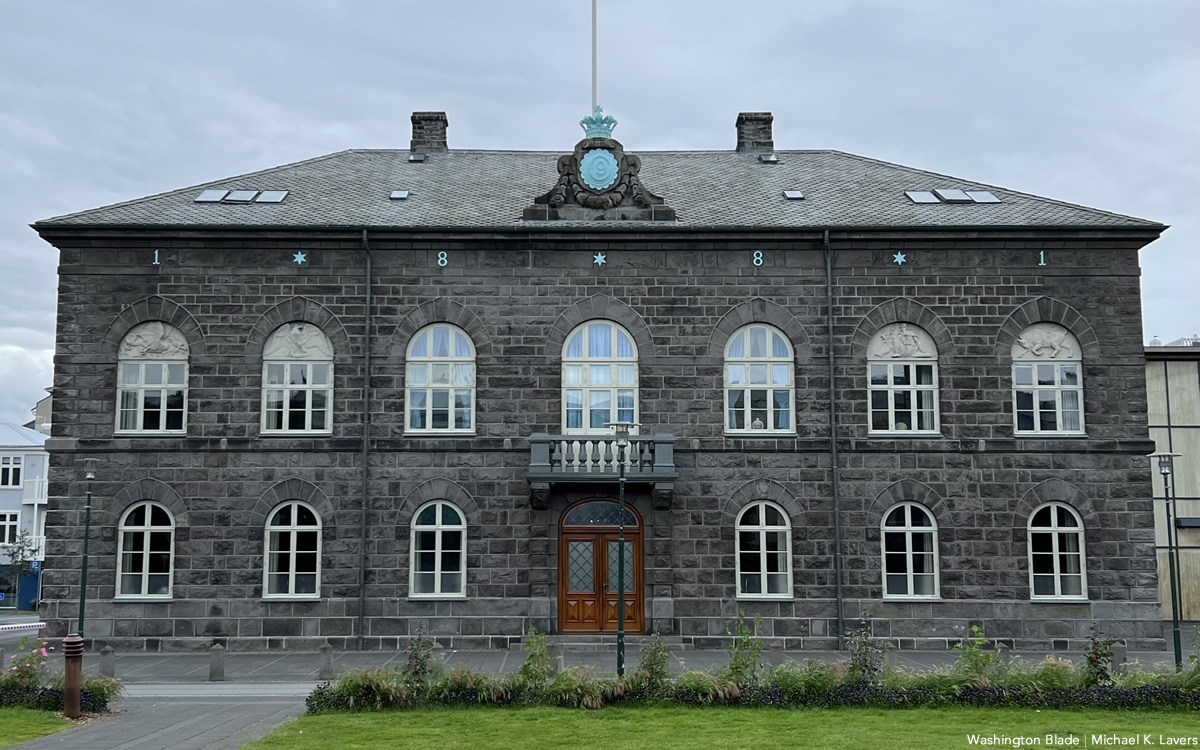
Edgars Rinkēvičs in June became Latvia’s first openly gay president. Spanish lawmakers in February approved a landmark Transgender rights law that allows anyone who is over 16-years-old to legally change their gender without medical intervention.
“Despite these gains, LGBTQI+ persons worldwide continue to experience alarming levels of violence, discrimination and isolation,” said Lee. “We are seeing increasingly coordinated efforts to undermine progress on human rights of LGBTQI+ persons worldwide, while seemingly targeted at a small slice of the population.”
Lee in her remarks specifically referenced the U.S. as one of the countries in which “we are seeing hateful shameful attacks on and against the LGBTQI+ persons, especially against LGBTQI children.”
Openly gay Irish Prime Minister Leo Varadkar, Chilean Foreign Minister Alberto Van Klaveren, Norwegian Foreign Affairs Minister Anniken Huitfeldt, Danish Development Cooperation and Global Climate Policy Minister Dan Jørgensen, Belgian Foreign Affairs Minister Hadja Lahbib, French Europe and Foreign Affairs Minister Catherine Colonna, Colombian Multilateral Affairs Vice Minister Elizabeth Taylor Jay, Brazilian Multilaterial Political Affairs Vice Minister Carlos Marcio Bicalho Cozendey and South African Department of International Relations and Cooperation Director General Zane Dangor are among those who also spoke at the event that Victor Madrigal-Borloz, the outgoing independent U.N. expert on LGBTQ+ and intersex issues, chaired.
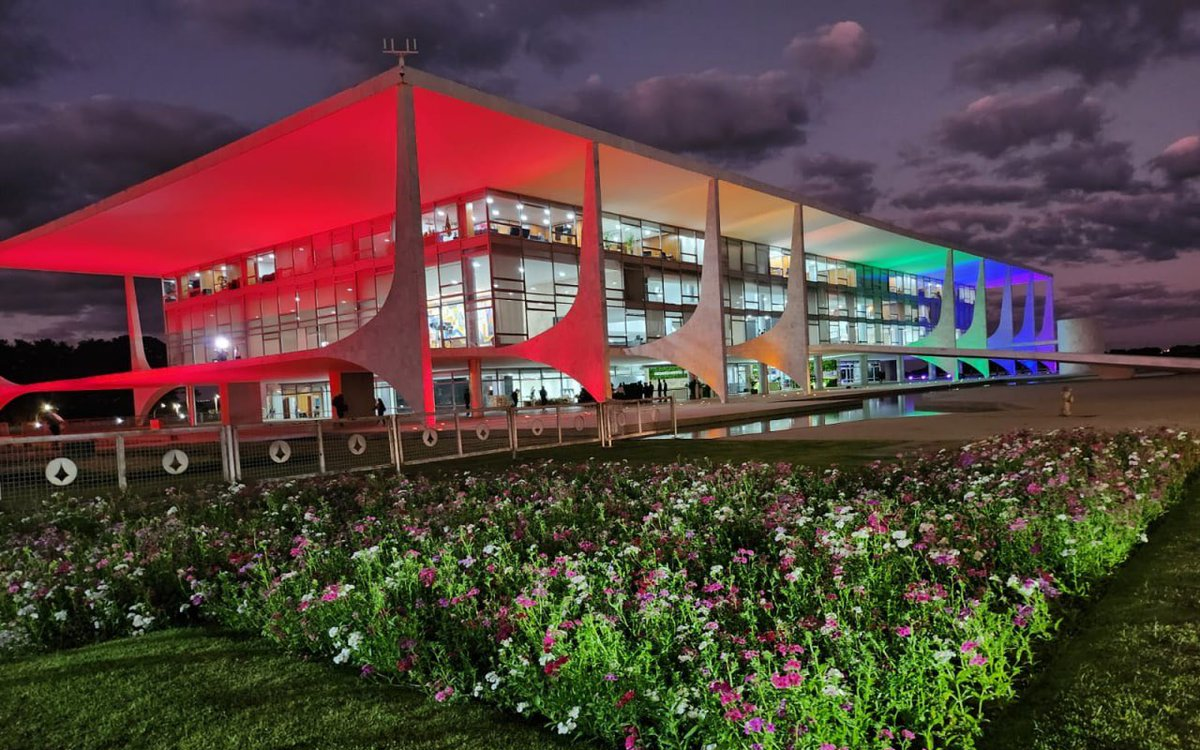
Human Rights Watch Executive Director Tirana Hassan and Chitsanupong Best Nithiwana, a transgender rights activist from Thailand, also participated. Openly gay Luxembourgish Prime Minister Xavier Bettel spoke virtually.
“My country, Ireland, has come a long way in recent years, particularly when we think about its LGBTI+ inclusion,” said Varadkar.
Varadkar said he was in high school when Ireland decriminalized consensual same-sex sexual relations in 1993.
Ireland in 2015 became the first country to extend marriage rights to same-sex couples through a popular vote. Ireland’s Gender Recognition Act took effect the same year. Varadkar noted his government is currently working to expunge convictions under the country’s sodomy law and plans to ban conversion therapy in the country.
“These are major legislative changes, but I think the real effect runs much deeper,” he said. “Our culture and our society has changed and there’s a better understanding of family and inclusion. The Ireland of today is a more understanding or accepting more inclusive and more equal country than it was in the past and more willing to respect fluidity, diversity and personal freedom.”
Varadkar, like Lee and others who spoke at the LGBTI Core Group event, expressed concern “about the alarming pushback against LGBT rights in some parts of the world, particularly criminalization, and the rise of violence, hatred towards members of our community at home and abroad.”
“We see in some countries, the reintroduction of draconian laws, including threat of the death penalty, openness, discrimination, as an increasing backlash against very vulnerable transgender people, and heightened political polarization, including here in the U.N,” he said. “I deeply regret the escalating attempts made by some states to undermine existing international commitments and standards.”
United Nations
Elise Stefanik pledges to advance ‘America First’ agenda at UN
Senate Foreign Relations Committee held confirmation hearing on Tuesday

The Senate Foreign Relations Committee on Tuesday held U.S. Rep. Elise Stefanik (R-N.Y.)’s confirmation hearing to become the next U.S. ambassador to the U.N.
The New York Republican did not specifically discuss LGBTQ+ or intersex rights, but in her opening statement she said President Donald Trump after he nominated her “shared with me that he sees great promise in the United Nations if it focuses on its founding mission of international peace and security.”
“President Trump has long advocated for peace and no wars,” said Stefanik. “He delivered the Abraham Accords (the 2020 agreement in which Bahrain, the United Arab Emirates, and Morocco normalized relations with Israel), the largest step to regional peace in a quarter century.”
“If confirmed, I will work to ensure that our mission to the United Nations serves the interests of the American people and represents President Trump’s America First peace through strength foreign policy,” she added.

Stefanik, 40, has represented New York’s 21st Congressional District since 2015. She later became chair of the House Republican Conference.
Stefanik in 2019 voted for the Equality Act, but she opposed it in 2021. Stefanik in 2022 is among the dozens of Republicans who voted for the Respect for Marriage Act that then-President Joe Biden signed.
Stefanik, among other things, has also been outspoken against antisemitism on college campuses.
U.S. Sen. Dave McCormick (R-Pa.) on Tuesday asked Stefanik about what he described as antisemitism and “anti-Israel bias” at the U.N.
“If you look at the antisemitic rot within the United Nations, there are more resolutions targeting Israel than any other country, any other crisis, combined,” said Stefanik.
“We need to be a voice of moral clarity,” she added.
The hearing took place less than a day after the Senate confirmed Secretary of State Marco Rubio.
United Nations
Elise Stefanik nominated to become next UN ambassador
N.Y. Republican voted for Respect for Marriage Act in 2022

President-elect Donald Trump on Monday announced he will nominate U.S. Rep. Elise Stefanik (R-N.Y.) to become the next U.S. ambassador to the U.N.
“Elise is an incredibly strong, tough, and smart America First fighter,” Trump said in a statement that announced the nomination.
Stefanik, 40, has represented New York’s 21st Congressional District since 2015. She has chaired the House Republican Conference since 2021.
Stefanik in 2019 voted for the Equality Act, but she opposed it in 2021. Stefanik in 2022 is among the dozens of Republicans who voted for the Respect for Marriage Act that President Joe Biden signed.
Stefanik, among other things, has also been outspoken against anti-Semitism on college campuses. She would succeed U.S. Ambassador to the U.N. Linda Thomas-Greenfield if the U.S. Senate confirms her.
United Nations
Jill Biden headlines UN LGBTI Core Group event
General Assembly taking place this week in New York

First lady Jill Biden on Monday headlined an LGBTQ and intersex rights event that took place on the sidelines of the U.N. General Assembly.
“Our humanity — that simple fact — guarantees us certain rights,” said Biden in her speech at the U.N. LGBTI Core Group event. “It doesn’t matter who you are, where you were born, or who your parents are: Being human is enough.”
The European Union and more than three dozen countries are members of the Core Group, a group of U.N. member states that have pledged to support LGBTQ and intersex rights.
The Netherlands and Argentina, which currently co-chair the Core Group, and Outright International, a global LGBTQ and intersex rights group, organized the event. Jessica Stern, the special U.S. envoy for the promotion of LGBTQ and intersex rights, introduced the first lady.
Biden in her remarks referenced O’Shae Sibley, a gay man who was stabbed to death in July 2023 while vogueing at a Brooklyn, N.Y., gas station.
She noted the Human Rights Campaign last year “declared a ‘state of emergency’ for LGBTQI people in America, because states across our country passed an unprecedented number of discriminatory laws.” Biden also said consensual same-sex sexual relations remain criminalized in more than 60 countries around the world.
“We’re not going to stand for hate, discrimination, and violence in our own country,” she said. “We won’t stand for it anywhere in the world.”
Biden noted “more countries” in recent years — Singapore, the Cook Islands, Antigua and Barbuda, and Barbados, among others — have decriminalized consensual same-sex sexual relations. Biden also highlighted other countries — Greece, Liechtenstein, Estonia, Cuba, and Chile, among others — in recent years have extended marriage rights to same-sex couples.
“These are big victories — ones that bloom across history,” she said.
“But our triumphs live in the small moments too — moments that would have been unimaginable just a few decades ago: Walking down the street without fear. Co-workers who use your chosen name and pronouns. Kids with two moms or two dads at the playground. Coming together for LGBTQI rights during the United Nations General Assembly,” added Biden.
The promotion of LGBTQ and intersex rights abroad has been a cornerstone of the Biden-Harris administration’s overall foreign policy.
Then-Vice President Joe Biden in 2016 spoke at a Core Group event that took place on the sidelines of that year’s U.N. General Assembly. He described the LGBTQ and intersex rights movement as the “civil rights issue of our time.”
“Discrimination against anyone for their sexual orientation and gender is anathema to most basic values,” said Joe Biden.
Other participants in Monday’s event include:
• Dutch Foreign Affairs Minister Caspar Veldkamp
• Ricardo Lagorio, Argentina’s permanent representative to the U.N.
• Graeme Reid, the independent U.N. expert on LGBTQ and intersex issues
• U.N. High Commissioner for Human Rights Volker Türk
• Former Finnish President Tarja Halonen
• Deputy Luxembourgish Prime Minister Xavier Bettel
• Chilean Social Development and Family Minister Javiera Toro Cáceres
• European Union External Action Service Secretary General Stefano Sannino
• Colombian Multilateral Affairs Vice Minister Kandya Obezo
• French LGBT+ Rights Ambassador-at-Large Jean-Marc Berthon
• Vanessa Dolce de Faria, the high representative for gender issues in the Brazilian Foreign Affairs Ministry
• Philippe Kridelka, Belgium’s permanent representative to the U.N.
• Vanessa Frazier, Malta’s permanent representative to the U.N.
• David Sigurdsson, director of U.N. Affairs in the Icelandic Foreign Affairs Ministry
• Outright International Executive Director Maria Sjödin
• Ugandan activist Gloriah Dhel
• Filipina activist Venus Aves
United Nations
UN officials reiterate calls for countries to decriminalize homosexuality
Volker Türk and Winnie Byanyima issued statement before global AIDS conference
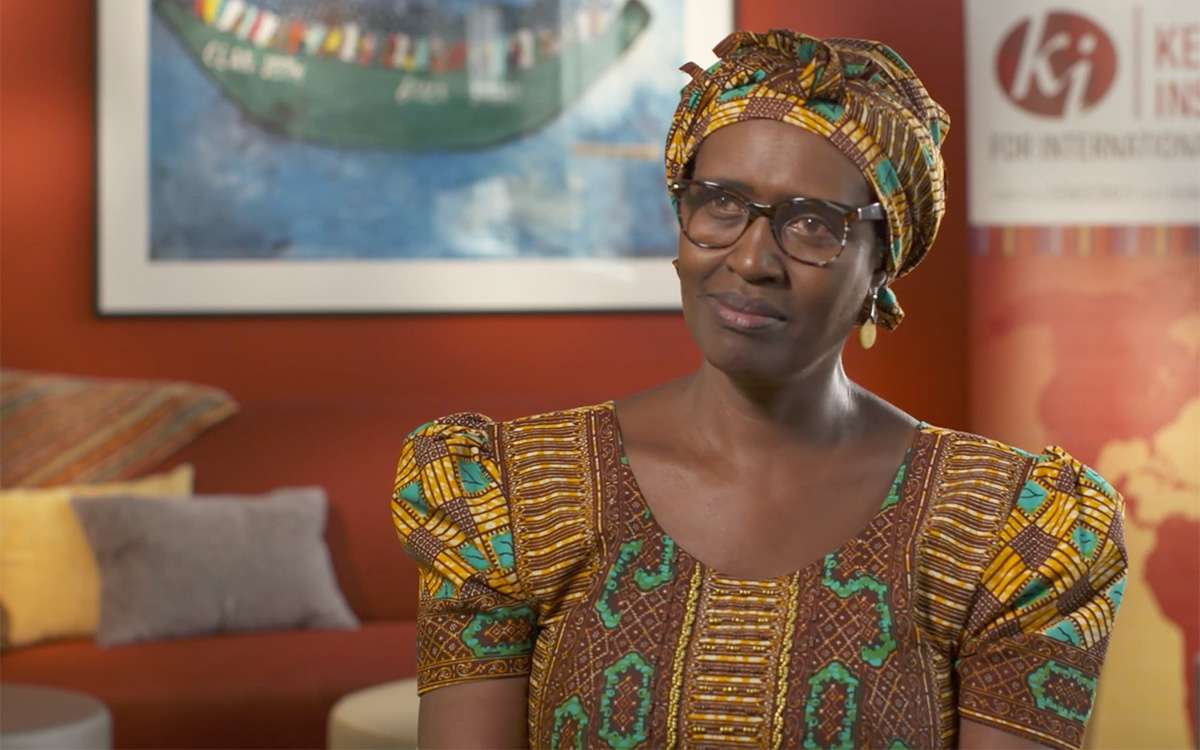
The U.N. human rights chief and UNAIDS’s executive director have reiterated their calls for countries to decriminalize consensual same-sex sexual relations.
“Laws criminalizing LGBTQ+ people must be consigned to history,” said Volker Türk and Winnie Byanyima in a statement they released on July 19.
The 25th International AIDS Conference began in Munich on Monday.
The statement notes Angola, Antigua and Barbuda, Barbados, Belize, Bhutan, Botswana, the Cook Islands, Dominica, Gabon, India, Mauritius, Mozambique, Namibia, Nauru, Palau, St. Kitts and Nevis, Seychelles, Singapore, and Trinidad and Tobago over the last decade have repealed laws that criminalized consensual same-sex sexual relations.
The Namibian High Court on June 21 struck down the country’s Apartheid-era sodomy laws.
Dominica’s High Court of Justice in April ruled provisions of the country’s Sexual Offenses Act that criminalized anal sex and “gross indecency” were unconstitutional. Justice Kimberly Cenac-Phulgence in the decision said “the laws commonly known as buggery and gross indecency laws, contravenes the constitution of the Commonwealth of Dominica, namely the right to liberty, freedom of expression, and protection of personal privacy.”
Burkina Faso’s military government earlier this month said it plans to criminalize consensual same-sex sexual relations in the country. Ugandan activists continue to challenge their country’s Anti-Homosexuality Act.
Activists maintain criminalization laws harm people with HIV/AIDS, among other groups. Türk and Byanyima in their statement say these statutes “harm public health.”
“Criminalization of LGBTQ+ people generates justified fear amongst people who need access to health services, and amongst the frontline workers who provide those services,” they said.
“In criminalizing countries, there is decreased provision and uptake of HIV prevention services, and decreased uptake of HIV care and treatment services,” added Türk and Byanyima.
They conclude the “decriminalization of LGBTQ+ people is vital for protecting everyone’s human rights and everyone’s health.”
United Nations
US ambassador to UN: LGBTQ+ community ‘has shown remarkable bravery and resilience’
Linda Thomas-Greenfield hosted Pride Month reception on Tuesday

UNITED NATIONS — U.S. Ambassador to the U.N. Linda Thomas-Greenfield on Tuesday at her annual Pride Month reception at the U.N. criticized those in the U.S. and elsewhere who continue to crackdown on LGBTQ+ and intersex rights.
Thomas-Greenfield noted in the U.S. “a small, but threatening group of people continues to garget the LGBTI+ community, and especially trans individuals.” She specifically pointed out the increase of hate crimes in schools, especially in states with laws that target LGBTQ+ students.
Thomas-Greenfield described Uganda’s Anti-Homosexuality Act — which contains a death penalty provision for “aggravated homosexuality” — as “draconian.” She also cited the case of a Russian woman who authorities jailed because she wore rainbow earrings.
“Despite these challenges, the LGBTI+ community has shown remarkable bravery and resilience,” said Thomas-Greenfield.
Lawmakers in Greece, Estonia and Thailand since Thomas-Greenfield hosted her 2023 Pride Month reception extended marriage rights to same-sex couples.
Latvian President Edgars Rinkēvičs and French Prime Minister Gabriel Attal, who are both gay, took office in July 2023 and in January 2024 respectively.
Dominica’s High Court of Justice in April struck down provisions of a law that criminalized consensual same-sex sexual relations. German lawmakers the same month approved a statute that will make it easier for transgender and nonbinary people to legally change their name and gender.
The U.N. has faced criticism over its response to Hamas’s surprise attack against Israel on Oct. 7. The Washington Blade, which attended Tuesday’s reception, saw at least one person wearing a keffiyah, a symbol of Palestinian solidarity.
“Since day one, the Biden administration has made it a priority to prevent and combat discrimination, hatred and violence on the basis of sexual orientation, and gender identity,” said Thomas-Greenfield. “I’m proud of the many, many ways … that U.S. U.N. has led on this front.”
Thomas-Greenfield in 2023 chaired a meeting that examined ways the U.N. Security Council can integrate LGBTQ+ and intersex rights into its work.
The U.S. is among the dozens of countries that are members of the LGBTI Core Group, a group of U.N. countries that have pledged to support LGBTQ+ and intersex rights.
Thomas-Greenfield on Tuesday noted the U.S. continues to work with the U.N. Economic and Social Council to include LGBTQ+-specific language in resolutions that focus on elections and democracy. She also referenced the group of activists who gathered in Dag Hammerskjöld Plaza, which is across the street from the U.N., in April 1965 to “protest the treatment of gay individuals at home and abroad.”
“We’re following in the footsteps of those marchers outside in Dag Hammarskjöld Plaza all those years ago,” she said.
Jessica Stern, the special U.S. envoy for the promotion of LGBTQ+ and intersex rights abroad, also spoke at the reception. The New York City Gay Men’s Chorus and the West Point Benny Havens Band performed.
United Nations
UN Women calls gender-criticals an extremist anti-rights movement
The UN has an important role to play to combat international disinformation regarding LGBTQ+ people, especially transgender individuals

By Erin Reed | NEW YORK – In an announcement for Pride Month, UN Women—the United Nations entity responsible for global women’s issues—announced that anti-rights movements are on the rise across the world with respect to LGBTQ+ people.
The organization highlighted steps being taken in several countries to target transgender people, women, and LGBTQ+ people with overtly discriminatory policies and restrictions. UN Women also explicitly called out several movements as “anti-rights,” including the “gender-critical” movement, which frames women’s rights as being in opposition to transgender people.
On June 11th, UN Women took to social media to sound the alarm on the surge of anti-LGBTQ+ movements, which have been fueled by a 50% funding increase over the past decade. The UN’s arm for global women’s issues highlighted how these anti-rights movements are gaining traction worldwide, notably those trying to pit trans rights against women’s rights. “Some try to frame the human rights of transgender people as being at odds with women’s rights, for instance, asserting that trans women pose a threat to the rights, spaces, and safety of cisgender women,” the announcement stated.
However, such assertions have no factual basis; transgender people are often the most at risk in such spaces, and hate-fueled rhetoric from these movements can increase that risk.
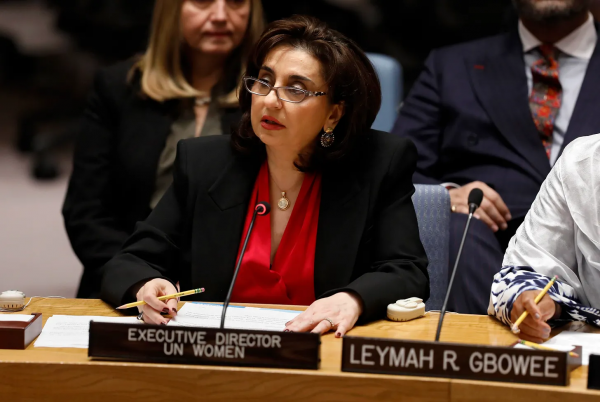
Perhaps most impactful, though, is the full report released alongside the announcement. In the report, UN Women explicitly calls out the “gender-critical” movement, which has infamous adherents such as J.K. Rowling, as being an extremist “anti-rights” movement similar to “men’s rights activism” in rhetoric:
“There is a long tradition in which anti-rights movements frame equality for women and LGBTIQ+ people as a threat to so-called “traditional” family values. Movements encompassing “anti-gender”, “gender-critical”, and “men’s rights” have taken this to new extremes, tapping into wider fears about the future of society and accusing feminist and LGBTIQ+ movements of threatening civilization itself.
Anti-rights movements have pushed for overtly discriminatory policies and restrictions on essential services, and even for the criminalization of people based on their actual or perceived sexual orientation, gender identity, or gender expression.”
Currently, the “gender-critical” movement is most active in the United Kingdom. Recently, Conservative Women and Equalities Minister Kemi Badenoch revealed that members of the movement were put in key health positions to produce the Cass Review, a report that resulted in broad-scale attacks on transgender youth and their medical care in the country. Similarly, the U.K. is currently grappling with attempts to promote conversion therapy of transgender youth, ban trans people from bathrooms that align with their gender identity, and exclude trans women from women’s hospital wards.
In the United States, Republican candidates and legislators have latched onto similar language, passing “Women’s Bills of Rights” that contain little regarding women’s rights but instead target transgender women’s access to bathrooms and seek to end legal recognition of transgender people altogether. Notably, these legislators and the organizations that push the bills often oppose many other women’s rights issues, such as reproductive healthcare access, abortion rights, and generous paid family leave.
The move to declare “gender-criticals” an anti-rights movement is a notable one. In recent years, the United Nations Special Rapporteur on Violence Against Women, Reem Alsalem, has supported “gender-critical” issues and been praised by supporters of the movement for doing so.
Notable actions taken by Alsalem include opposing Biden’s Title IX policies for transgender youth in the U.S. and the World Health Organization’s support for self-determined gender identity. In these policies, Alsalem explicitly frames women’s rights and the safety of women’s spaces as being in competition with transgender inclusion.
Alsalem has also historically shared content from far-right, anti-LGBTQ+ organizations like the Alliance Defending Freedom International, which has promoted anti-LGBTQ+ policies globally.
The United Nations has an important role to play in the coming years to combat international disinformation regarding LGBTQ+ people, especially transgender individuals. SPLC-designated hate organizations such as the Society for Evidence in Gender Medicine and Genspect have gained power and operate in multiple countries to oppose transgender rights. Victories obtained in one country are then used as justification to get other countries to follow suit.
In the U.S., they are likewise used in court fights and legislative hearings over transgender rights. The UN’s move signals that such international attacks on transgender people may be beginning to be recognized by one of the world’s most important international organizations, and that recognition could be the most crucial step toward combating further attacks.
******************************************************************************************

Erin Reed is a transgender woman (she/her pronouns) and researcher who tracks anti-LGBTQ+ legislation around the world and helps people become better advocates for their queer family, friends, colleagues, and community. Reed also is a social media consultant and public speaker.
******************************************************************************************
The preceding article was first published at Erin In The Morning and is republished with permission.
United Nations
UN Human Rights Council adopts intersex rights resolution
The resolution received overwhelming support from member states, with none voting against it. The final vote was 24-0 with 23 abstentions
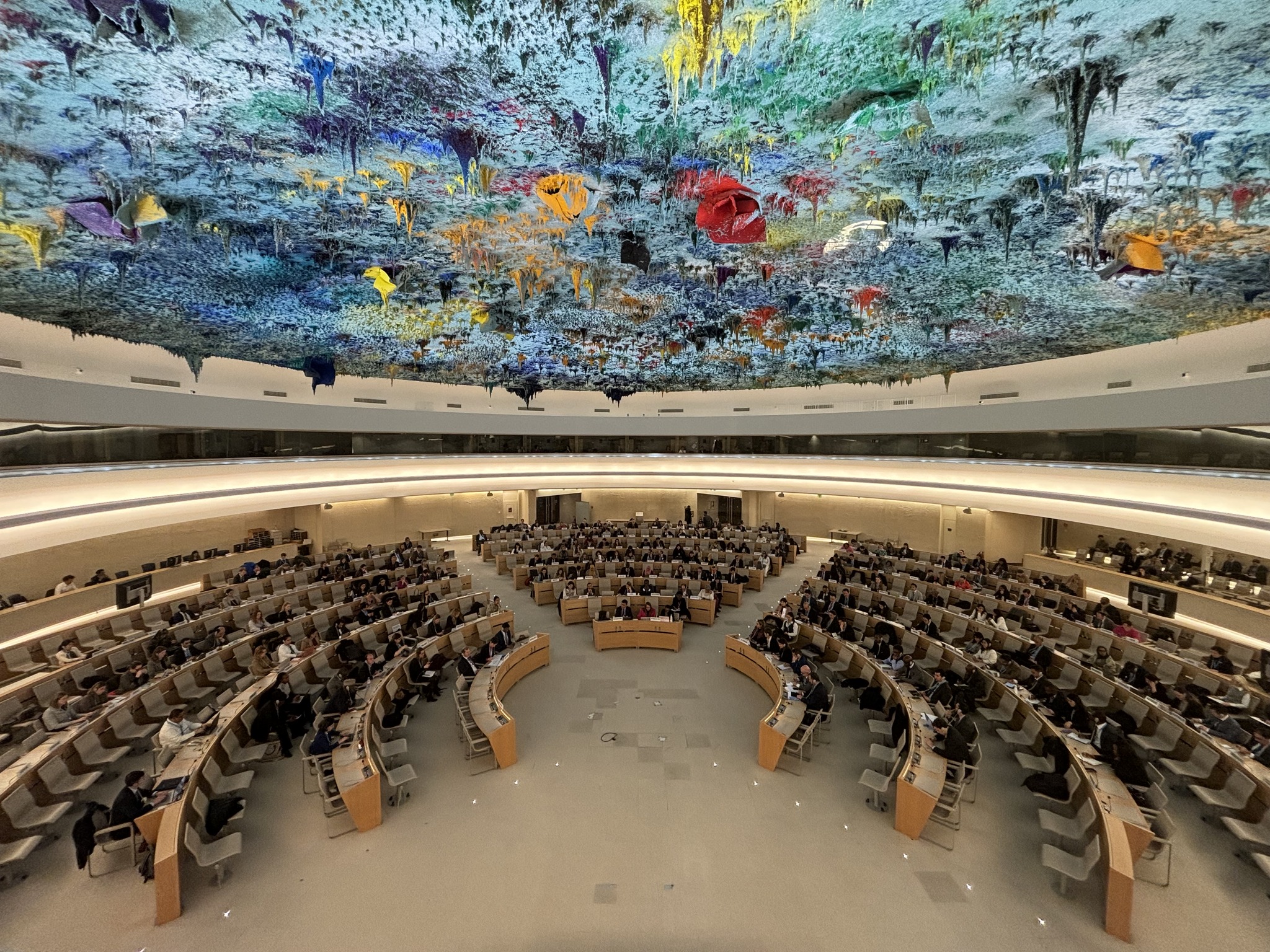
By Amber Laenen | GENEVA, Switzerland – The U.N. Human Rights Council on Thursday adopted a landmark resolution in support of the rights of intersex people.
The first-of-its-kind resolution specifically targets discrimination, violence and harmful practices against those with innate variations in sex characteristics. The resolution received overwhelming support from member states, with none voting against it.
The final vote was 24-0 with 23 abstentions.
The resolution that Finland, South Africa, Chile and Australia proposed urges countries to strive towards ensuring the highest possible standard of physical and mental health for intersex people. It also calls upon the Office of the High Commissioner to compile a report, slated for discussion at the council in September 2025.
This report will assess discriminatory laws and policies; acts of violence and harmful practices around the world, while also identifying best practices and legal protections for intersex people.
“This resolution represents yet another landmark in the international community’s attention to the rights of intersex individuals,” stated 35 advocacy groups in a joint press release they issued after the resolution’s adoption. “Years of concerted efforts by both civil society and states have generated significant momentum, but this resolution could catalyze even more decisive action.
By prompting the first official United Nations report on the human rights status of individuals with innate variations in sex characteristics, this vote will elevate awareness to a level that states can no longer ignore, compelling them to take concrete measures.”
The resolution expresses “grave concern” over the violence and harmful practices faced by intersex individuals, including medically unnecessary interventions regarding sex characteristics. It furthermore acknowledges this call to action aligns with statements from various human rights bodies and the commitments outlined in the Sustainable Development Goals, particularly the one that addresses health and well-being.
“We extend our gratitude to the cross-regional coalition of states that spearheaded this resolution, as well as those who supported it,” said the advocacy groups in their press release. “Intersex individuals are present in every corner of the globe, yet they endure pervasive human rights violations, including forced medical interventions, infanticide, denial of legal recognition and discrimination in accessing essential services such as healthcare, education and sports. The United Nations’ intervention to address this situation holds immense significance in improving the lives of intersex individuals worldwide.”
**************************************************************************************
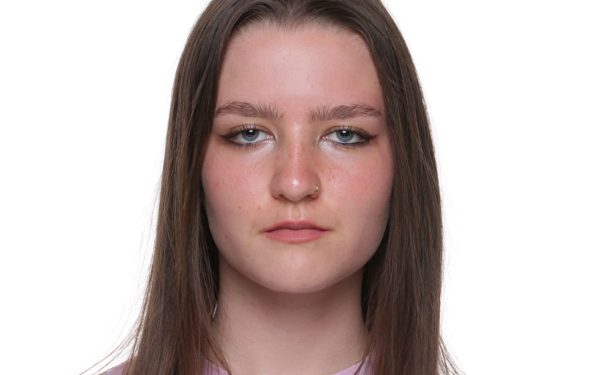
Amber Laenen is a senior at Thomas More Mechelen University in Belgium. She is majoring in journalism and international relations. Amber is interning with the Blade this semester as part of a continued partnership with the Washington Center.
United Nations
US global LGBTQ+, intersex rights envoy participates in UN women’s conference
Jessica Stern traveled to N.Y. this week
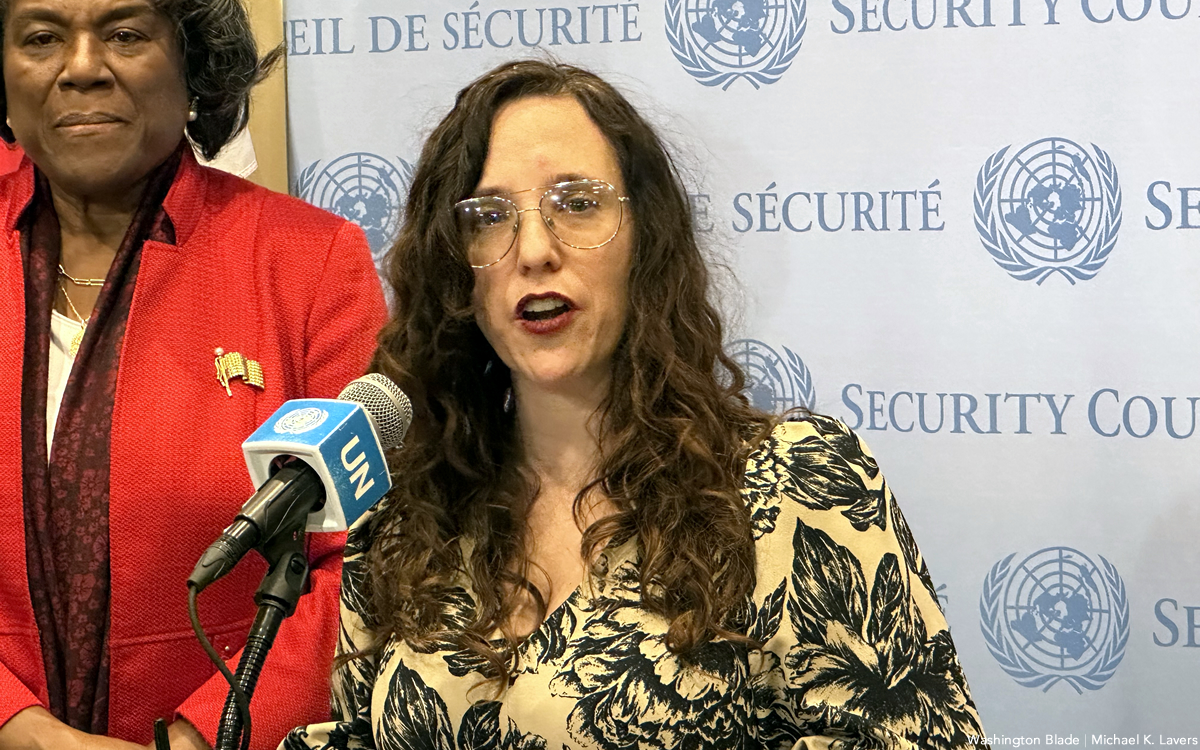
By Amber Laenen | UNITED NATIONS — Jessica Stern, the special U.S. envoy for the promotion of LGBTQ+ and intersex rights abroad, traveled to New York this week to participate in the 68th session of the Commission on the Status of Women at the U.N.
Stern arrived in New York on Tuesday and left on Friday.
The CSW68, the largest annual U.N. gathering on gender equality and women’s empowerment, began on Monday and will take place through March 22 under the theme of “accelerating the achievement of gender equality and the empowerment of all women and girls by addressing poverty and strengthening institutions and financing with a gender perspective.” This year’s session holds particular significance as global statistics reveal persistent gender disparities, with 10.3 percent of women living in extreme poverty and progress towards poverty eradication lagging significantly behind targets.
Accelerating progress towards gender equality necessitates substantial investment, with an estimated additional $360 billion per year needed to achieve key global goals. Stern while in New York sought to advocate for prioritizing policies and programs that address gender inequalities and enhance women’s agency and leadership, noting the transformative impact such investments could have on lifting millions out of poverty and spurring economic growth.
At CSW68, governments, civil society organizations, experts and activists will converge to discuss actions and investments aimed at ending women’s poverty and advancing gender equality.
Moreover, the CSW68 serves as a critical platform for sharing best practices and innovative approaches to addressing gender disparities. Stern participated in panel discussions and workshops, offered insights gleaned from her extensive experience in advocating for the rights of LGBTQ+ people and marginalized communities.
**************************************************************************************

Amber Laenen is a senior at Thomas More Mechelen University in Belgium. She is majoring in journalism and international relations. Amber is interning with the Blade this semester as part of a continued partnership with the Washington Center.
United Nations
Biden references LGBTQ+, intersex rights in UN General Assembly speech
‘We cannot turn away from abuses’

UNITED NATIONS — President Joe Biden on Tuesday noted LGBTQ+ and intersex rights in his speech to the U.N. General Assembly.
“We cannot turn away from abuses, whether in Xinjiang, Tehran, Darfur or anywhere else. We have to continue working to ensure that women and girls enjoy equal rights and equal participation in their society; that indigenous groups, racial, ethnic, religious minorities, people with disabilities do not have their potential stifled by systemic discrimination, that the LGBTQI+ people are not prosecuted or targeted with violence because of who they are,” said Biden. “These rights are part of our shared humanity. When they’re absent anywhere, their loss is felt everywhere. They are essential in the advancement of human progress that brings us together.”
Biden in 2021 signed a memo that committed the U.S. to promoting LGBTQ+ and intersex rights abroad as part of his administration’s overall foreign policy.
The General Assembly is taking place less than five months after Ugandan President Yoweri Museveni signed his country’s Anti-Homosexuality Act, which contains a death penalty provision for “aggravated homosexuality.”
The U.S. in June imposed visa restrictions on Ugandan officials. The World Bank Group last month announced the suspension of new loans to Uganda.
Biden in 2022 reiterated his administration’s commitment to LGBTQ+ and intersex rights abroad in his General Assembly speech.
U.S. Ambassador to the U.N. Linda Thomas-Greenfield earlier this year chaired a U.N. meeting that focused on the integration of LGBTQ+ and intersex rights into the U.N. Security Council’s work.
The U.S. is among the dozens of countries that are members of the U.N. LGBTI Core Group, a group of U.N. countries that have pledged to support LGBTQ+ and intersex rights. California Congresswoman Barbara Lee and openly gay Irish Prime Minister Leo Varadkar are among those who spoke at an event on Monday on the sidelines of the General Assembly that commemorated the group’s 15th anniversary.
PEPFAR has saved more than 25 million lives
Biden in his speech also highlighted the President’s Emergency Plan for AIDS Relief.
“HIV/AIDS infections and deaths plummeted in no small part because of PEPFAR’s work in more than 55 countries, saving more than 25 million lives,” he said.
American officials earlier this year postponed a meeting on PEPFAR’s work in Uganda in order to assess the Anti-Homosexuality Act’s potential impact on it.
U.S. Capitol Police on Sept. 11 arrested seven HIV/AIDS activists who refused to leave House Speaker Kevin McCarthy (R-Calif.)’s office in the Rayburn House Office Building. Housing Works CEO Charles King, Housing Works President Matthew Bernardo and Health GAP Executive Director Asia Russell are among those who demanded the California Republican to reauthorize PEPFAR.
Ukraine, climate change and democracy are three of the other issues that Biden noted in his General Assembly speech.
United Nations
UN Security Council urged to focus on LGBTQ+, intersex rights
U.S. Ambassador to the U.N. Linda Thomas-Greenfield chaired Monday meeting

UNITED NATIONS — U.S. Ambassador to the U.N. Linda Thomas-Greenfield on Monday chaired a meeting at the United Nations that focused on the integration of LGBTQ+ and intersex rights into the U.N. Security Council’s work.
The U.S. Mission to the U.N. co-sponsored the meeting along with Albania, Brazil, Cyprus, the Czech Republic, France, Greece, Japan, Malta, Switzerland, the U.K. and the LGBTI Core Group, a group of U.N. countries that have pledged to support LGBTQ+ and intersex rights.
Thomas-Greenfield announced four “specific steps the U.S. will take to better integrate LGBTQI+ concerns into the U.N. Security Council’s daily work.”
• A regular review of the situation of LGBTQ+ and intersex people in conflict zones on the Security Council’s agenda that “includes regularly soliciting information from LGBTQI+ human rights defenders.
• Encouraging the U.N. Secretariat and other U.N. officials to “integrate LGBTQI+ concerns and perspectives in their regular reports” to the Security Council.
• A commitment “to raising abuses and violations of the human rights of LGBTQI+ people in our national statements in the Security Council.”
• A promise to propose, “when appropriate, language in Security Council products responding to the situation of LGBTQI+ individuals.”
“We are proud of these commitments,” said Thomas-Greenfield during Monday’s meeting. “They are just the beginning.”
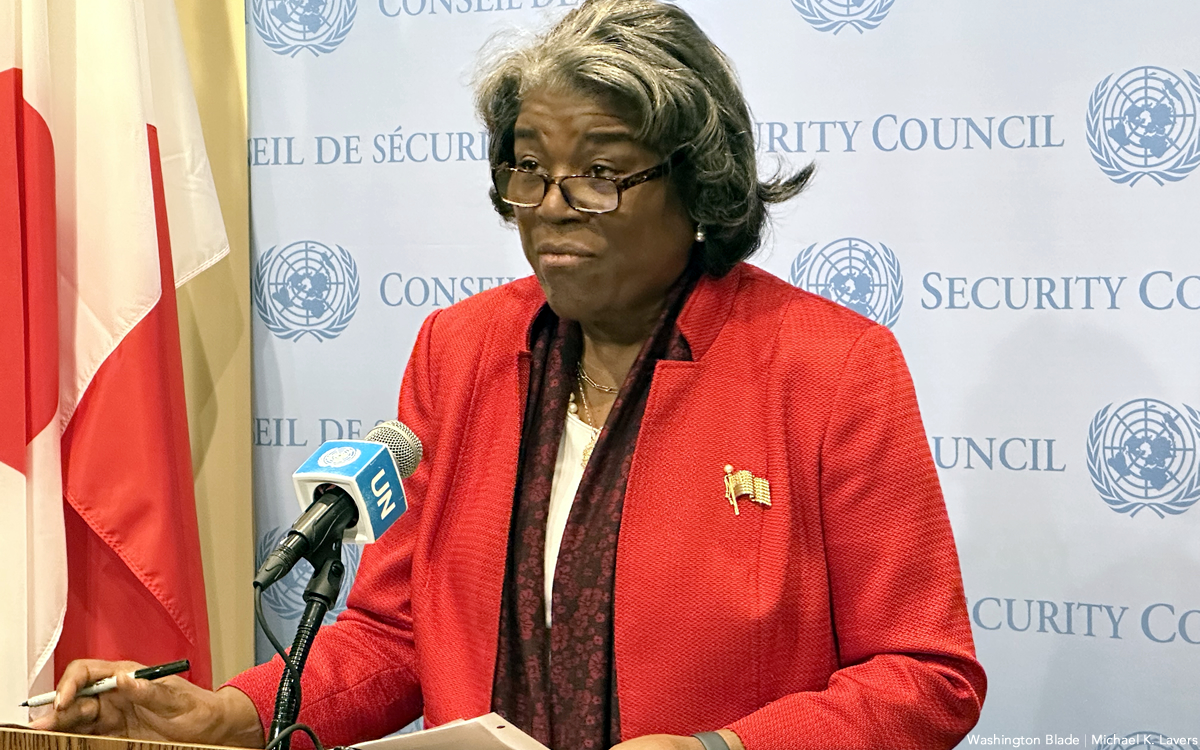
Victor Madrigal-Borloz, the independent U.N. expert on LGBTQ+ and intersex issues, provided a briefing on LGBTQ and intersex rights around the world.
“My mandate is based on one single fact: Diversity and sexual orientation and gender identity is a universal feature of humanity,” he said. “For too long, it has been made invisible in national level contributions to peace and security, including policies and programs and in the political and programmatic action of the United Nations.”
María Susana Peralta of Colombia Diversa — an LGBTQ+ and intersex advocacy group in Colombia that participated in talks between the country’s government and the Revolutionary Armed Forces of Colombia that led to an LGBTQ+-inclusive peace agreement then-President Juan Manuel Santos and then-FARC Commander Rodrigo “Timochenko” Londoño signed in 2016 — and Afghan LGBT Organization Director Artemis Akbary also took part in the meeting.
Peralta said Colombia’s peace agreement “has created a standard by which other countries can use,” but noted the country’s Special Justice for Peace has yet to prosecute anyone who committed human rights abuses based on sexual orientation or gender identity during the war.
Akbary noted the persecution of LGBTQ+ and intersex people in Afghanistan has increased since the Taliban regained control of the country in 2021. Akbary also said LGBTQ+ and intersex Afghans cannot flee to Iran and other neighboring countries because of criminalization laws.
“The whole world is watching as the rights of LGBTQ people are systematically violated in Afghanistan,” said Akbary. “LGBTQ people on the ground in Afghanistan need and deserve protection.”
Representatives of U.N. delegations from France, Brazil, Albania, Japan, Ecuador, Switzerland, the U.K., Malta, Colombia, South Africa, Ireland, Germany, the Netherlands and the European Union spoke in favor of the integration of LGBTQ+ and intersex rights into the Security Council’s work.
“A person’s actual or perceived sexual orientation, gender identity or gender expression or sex characteristics often increases the risk of of becoming the target in conflict and crisis situations,” said Luis Guilherme Parga Cintra of Brazil.
British Ambassador to the U.N. General Assembly Richard Crocker made a similar point.
“We know the conflicts have disproportionate impact on marginalized communities: Women and girls, persons with disabilities, members of ethnic and religious minority groups,” he said. “It is only right the Security Council is discussing this issue today.”
Ambassador Karlito Nunes, who is Timor-Leste’s permanent U.N. representative, read a statement in support of the Security Council discussions about LGBTQ+ and intersex issues. Representatives from China, Russia and Ghana who spoke said the Security Council is not the appropriate place to discuss them.
“Sexual orientation is an individual choice of every individual,” said the Russian representative.
The meeting took place less than 13 months after Russia launched its war against Ukraine.
A Russian airstrike on March 1, 2022, killed Elvira Schemur, a 21-year-old law school student who volunteered for Kharkiv Pride and Kyiv Pride, while she was volunteering inside the Ukrainian city of Kharkiv’s regional administration building. Activists with whom the Washington Blade has spoken said LGBTQ+ and intersex people who lived in Russia-controlled areas of the country did not go outside and tried to hide their sexual orientation or gender identity because they were afraid of Russian soldiers.
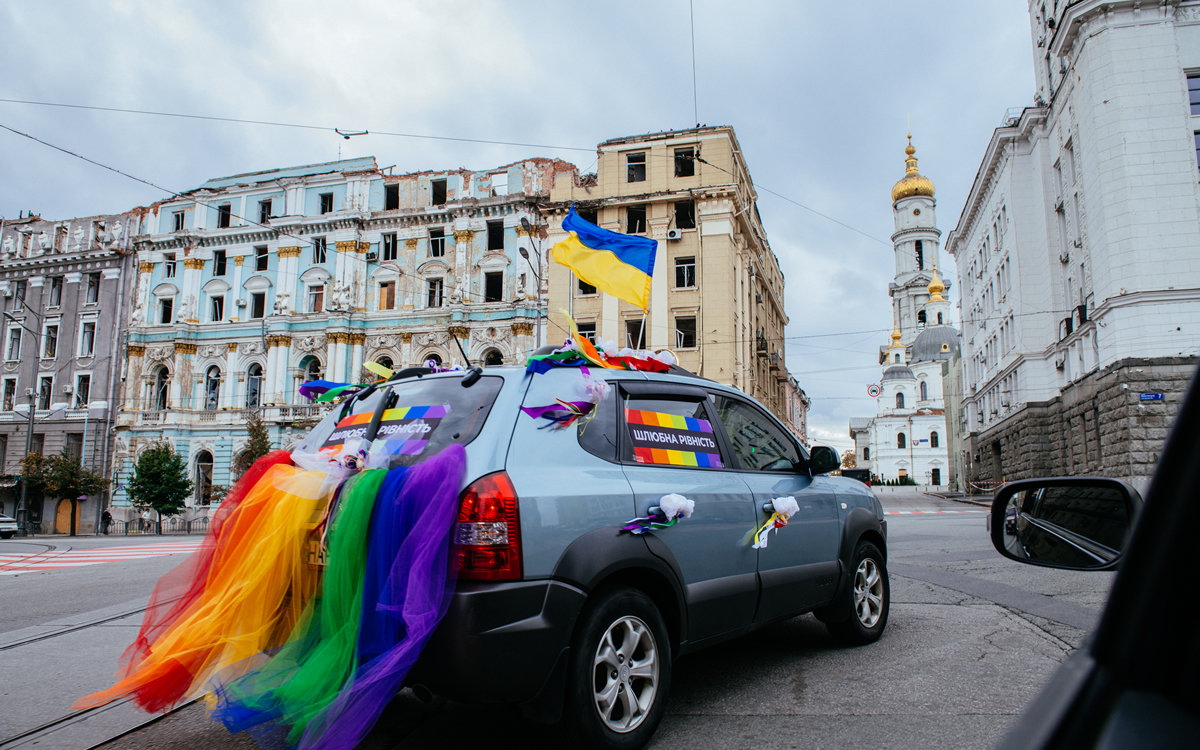
The Security Council’s first-ever LGBTQ+-specific meeting, which focused on the Islamic State’s persecution of LGBTQ+ Syrians and Iraqis, took place in 2015. Then-U.S. Ambassador to the U.N. Samantha Power, who is now director of the U.S. Agency for International Development, and then-International Gay and Lesbian Human Rights Commission Executive Director Jessica Stern, who is now the special U.S. envoy for the promotion of LGBTQ+ and intersex rights, are among those who participated.
Stern, along with U.S. Reps. David Cicilline (D-R.I.) and Ritchie Torres (D-N.Y.), attended the meeting alongside OutRight International Executive Director Maria Sjödin, among others.

The Security Council in June 2016 formally condemned the Pulse nightclub in Orlando, Fla. The U.N. Human Rights Council a few months later appointed Vitit Muntarbhorn as the first independent U.N. expert on LGBTQ+ and intersex issues. (Madrigal-Borloz succeeded Muntarbhorn in 2018.)
Then-U.S. Ambassador to the U.N. Kelly Knight Craft and then-U.S. Ambassador to Germany Richard Grenell in 2019 during a U.N. General Assembly meeting hosted an event that focused on efforts to decriminalize consensual same-sex sexual relations around the world.
President Joe Biden in 2021 signed a memo that committed the U.S. to promoting LGBTQ+ and intersex rights abroad as part of the Biden-Harris administration’s overall foreign policy. Then-State Department spokesperson Ned Price later told the Washington Blade the decriminalization of consensual same-sex sexual relations is one of the White House’s five priorities as it relates to the promotion of LGBTQ+ and intersex rights overseas.
The U.S., the U.K., France, China and Russia are the Security Council’s five permanent members. Albania, Brazil, Ecuador, Gabon, Ghana, Japan, Malta, Mozambique, Switzerland and the United Arab Emirates are the 10 non-permanent members.
Ghana and the United Arab Emirates are two of the dozens of countries in which consensual same-sex sexual relations remain criminalized.
“Today’s meeting was an important first step toward further concrete actions the Security Council, and all parts of the U.N., can take to integrate LGBTQI+ human rights, experiences, and perspectives into their day-to-day work,” Thomas-Greenfield told the Blade in a statement after Monday’s meeting. “We’re proud of the four commitments we made today, and we will keep working to make sure this topic remains on the Council’s agenda.”
-

 a&e features2 days ago
a&e features2 days agoMusical Mondays, a mainstay in WeHo nightlife, celebrates 16 years
-
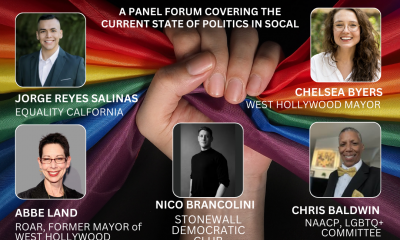
 Features5 days ago
Features5 days agoLos Angeles Blade kicks off Free Community Event Series with an informative political panel of government and advocacy group leaders
-

 Arts & Entertainment1 day ago
Arts & Entertainment1 day ago‘Bring it to Brunch’ returns to West Hollywood
-

 California15 hours ago
California15 hours agoSouth Park provides green space to a predominantly Latino community
-

 Myanmar1 day ago
Myanmar1 day agoLGBTQ+ advocacy group joins Myanmar earthquake relief effort
-

 a&e features2 days ago
a&e features2 days agoPeppermint thrives in the spotlight
-

 National10 hours ago
National10 hours agoLatest update in the case of wrongfully deported gay, Venezuelan make-up artist



